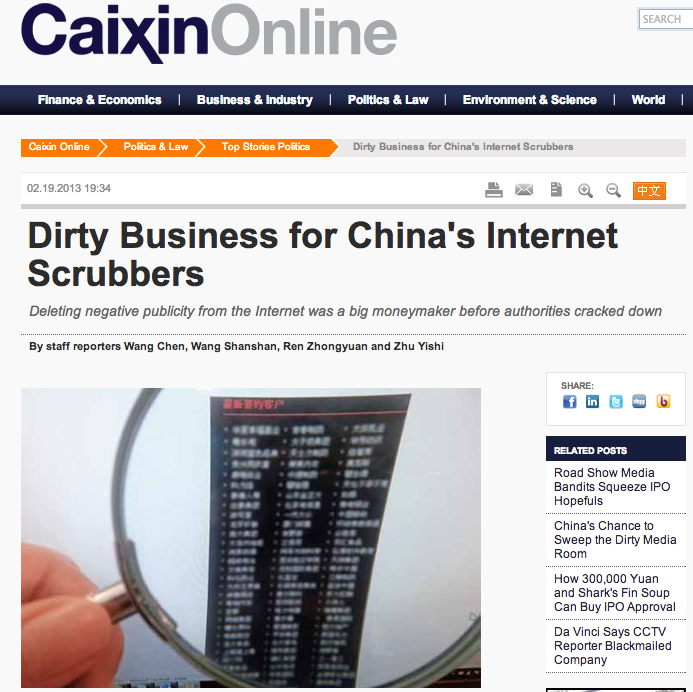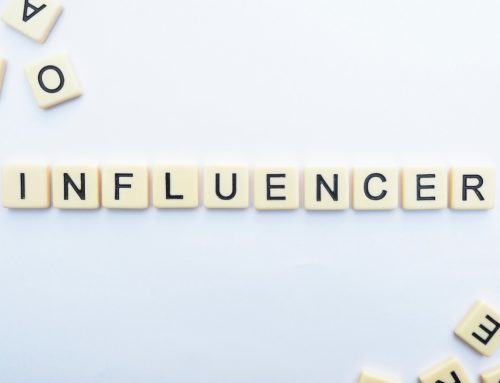 Terri Johnson tipped me off to a fascinating story yesterday. It’s an exposé of China’s “black PR industry.”
Terri Johnson tipped me off to a fascinating story yesterday. It’s an exposé of China’s “black PR industry.”
I had no idea such a thing existed, but here is how Charlie Custer, who summarized it for Tech in Asia, explains it:
“Black PR firms provide client companies with both post deletion services to help them escape negative news stories, and some also provide placement for soft ads and hit pieces attacking competitors. The top black PR firms can offer these services even for stories posted to China’s most popular news portals.”
Image: Arjen Toet via Flickr, CC 2.0
The bit about placing soft ads and hit pieces won’t shock or surprise you, since we’ve seen that happen here in the U.S. as well, disgusting as the practice is. And reputation management is often a large part of what we, as PR professionals, do; for some, it’s what they specialize in and focus on.
In fact, even those who don’t think they do it, probably do. For example, content marketing is as much about reputation as anything else; after all, we (organizations, or clients, or simply human beings) want people to think well of us, and to come to us for the right reasons… right?
Scrubbing the Internet
There are also numerous companies that offer to “scrub” your reputation for you (for varying amounts of money), or teach you how to do it yourself; though at least in the U.S., most people know enough to not overtly promote “black hat SEO” tactics to do so. In fact, companies like BrandYourself tell you point blank what they won’t do.
The approach I’ve seen (so far) from such firms primarily involves getting higher rankings for “relevant” and desired links, by tweaking keywords, generating useful content, etc… mostly in an above-board manner. This, again, is not a surprise. (I’ve never used BY, btw, I just found them when I was researching companies that offer this kind of service… case in point.)
But here is where I started to narrow my eyes as I read the article:
among other things, these “black PR” firms offer to delete negative articles and post “hit” pieces to China’s most popular news portals.
Not (just) search engines. Not pitch stories. Actually delete from, and post to, news portals.
The dirty saga in a nutshell
A “PR firm” called Yage Times, as well as several others (I put that in quotes because I am so disgusted that anyone purporting to be of our profession would dream up such a thing, let alone do it) were instrumental in “turning China’s website administration process into an illegal money machine” (as the Caixin story puts it).
Basically, the Yage gang started out by getting offending posts removed from, say, Baidu Tieba (essentially a humungous collection of online forums), simply by reporting them to whoever was in charge at BT.
The catch, for the unsuspecting clients, was that they didn’t know this didn’t cost anything… and Yage didn’t bother to tell them that.
No, instead, they started charging a lot of money to do this. And then, as is wont to happen with nefarious schemes, the schemes got even more nefarious, as flddling with posts started to get more complicated.
Now, as Cutter recaps on Tech in Asia,
“Deleting a post generally entails bribing either a management-level worker at the web portal you want to delete the article from or bribing a government or police official who can then send a deletion order to the web portal.”

You really must read the entire recap on Tech in Asia, which will then lead you to an English language version of the story on Caixin’s English site (Caixin was the Chinese magazine that broke the story… and ironically, the original Chinese-language story is nowhere to be found.)
You can see where this is going… or, rather, went, right?
Yage (and let’s not forget apparently many other firms did this too, but Yage is the focus of the article) apparently went from cheating clients, to bribing executives and government officials.
Oh, and they didn’t just get posts and articles deleted, they would work hand in glove with “Internet management officials” (and guess who those are, or are connected to, in China?) to actually block relevant keywords.
In other words: censorship.
And apart from some corporate biggies that were Yage’s clients, where did the bulk of the firm’s clients come from?
Government officials.
In China.
Which censors its own citizens.
I don’t know when they’re going to make a movie out of this, but someone has to.
Terri sent the story to my friend Kirk Hazlett (who is also part of the WUL blogging team) and I, because she knew how critical we both are of anything that is even remotely unethical. Kirk was kind enough to let me share it with you, to remind you – actually, us all – of this:
This kind of behavior isn’t just unethical. It’s illegal to boot. And when “unethical” meets “illegal” it is a bad, bad, bad thing.
There are enough shysters out there in general; the PR industry has more than its fair share of them.
Please, for the love of anything you believe in, don’t let money tempt you to join their ranks. It’s just not worth it.

![[EVENT]: PR Hacks for Small Biz (online)](https://shonaliburke.com/wp-content/uploads/2021/06/FB-Ad-1200x800-01-01-01-Copy-500x383.jpeg)








[…] age has given us an incredible opportunity to shape our own reputations. Let’s make sure to do so ethically… but let’s not waste […]
That article are good and informative like as that are given below Situations, in addition to several other people Post set which within insurance
quotes because I am so embarrassed which any one purporting that they are
connected with some of our career would aspiration up a really matter, not to
say undertake it, were being a key component within “turning China’s website
insolvency method in to a good illegal cash device.
Thanks……………………….///
<br><a href=”http://www.superioreducationz.com/”>Education Information</a>
@rjfrasca @shonali @ginidietrich you just aren’t spinning it the right way.
@steakbellie Touch̩ Рwell played @shonali @ginidietrich
@rjfrasca @Steakbellie @ginidietrich Definitely. ;)
@arkarthick @forthmetrics Thanks! @mmangen @geoffliving And to you too!
@shonali You’re welcome!
@ShellyKramer @shonali Whoa. “I don’t know when they’re going to make a movie out of this, but someone has to.” <– For real.
@ironscribe I know! @ShellyKramer thanks for sharing!
@seanmcginnis @TheJackB Thanks for sharing!
@shonali @TheJackB Always. :)
@seanmcginnis What he said. ;) @shonali
@mark_harai @AskAaronLee Thanks for sharing and @chillygal too (I KNOW!).
@geoffreiner Thanks for sharing! @junoesque I know, right? Also TY @SandraSays @GidicanB @SpinSucks @kmueller62 @howiegoldfarb
@rachelakay @mdbarber Thank you for sharing! Also @CyberlandGal @dashal @barrettrossie @snow1081 @GiniDietrich @bdorman264
Like @mattlacasse I am comfortable taking “suggestions” from my esteemed associates of the female persuasion, so, here you go @shonali :as promised….:
Where to start….. Nope, not surprised. As there ancient script says, “What has been will be again, what has been done will be done again; there is nothing new under the sun,” Combine that with another “Money is the root of all sorts of injurious things.” So… nope, not surprised at all Combine a lack of ethics with profit-driven focus & the demand for such services is created. There will always be interest in the expediency of looking good because it seems easier than actually being good (and if a corporate culture is rotten enough to engage in such dirty tricks, it couldn’t sustain being good for very long anyway). Then, so long as there is enough profit in providing those services, some equally unethical persons will be more than happy supply the demand. The technology is simply a vehicle to perform old dirty tricks in a newish way. From my very limited understanding of international government and business, it appears to me conditions are perfect in China for such a thing to flourish.
As far as dealing with such things closer to home, seems to me that history teaches that solutions would probably be twofold. First,. expose those creating the demand to the light of day, which only works because it can ultimately cut into profit by decreasing revenue and increase expense for defense. Second, prosecute the supply-siders to make it too costly for them to continue doing business and discourage others from engaging in it. Perhaps the PR community could play a huge part in one if there is enough vested interest. The Government would have to take the lead in the other. It’s all very sad, but also all very human (not the good part).
TomWillis That’s your first comment on my blog – w00t! Thank you. :)
I know – the money factor is what keeps stuff like this happening. Your point about the PR community taking a stand brings me back to the ongoing conversation in PR circles about accreditation, credentialing, etc. Unlike many other professions, we don’t have a “real” certification, such as CPAs or CFAs get. Our accreditation programs are the closest thing (iabc and prsa each have their own accreditation program, mine is from IABC) to that… but they’re not “enforceable,” as such. So even though we have our codes of ethics, as KirkHazlett writes about often, it’s really up to the professionals themselves to abide or not abide by them.
arthury archanaverma … any thoughts?
ShonaliTomWillisarchanaverma You may be sorry you invited me into the conversation! But, we’re talking about three separate issues.
Credentialing, as @shonali notes, currently exists in the form of the APR and ABC credentials offered via the UAB’s eight participating organizations (@PRSA is one) and @IABC, respectively. The credential is voluntary (e.g., you don’t need one to practice public relations), and while ethics comprises 15 percent of the knowledge base necessary to become APR, there’s no mechanism for stripping a professional of his/her APR designation for ethical misconduct. A PRSA member, however, may have his/her membership revoked for misstatements or omissions on their membership applications or for being convicted of a felony or misdemeanor related to the conduct of public relations; but not, for example, for something like “Black PR.”
Why is there no enforcement mechanism tied to the APR or even more broadly to PRSA membership? Cost, lack of cooperation and legal liability are the main reasons. Investigating alleged ethical violations requires significant investments of time, money and resources, which PRSA (a non-profit) didn’t and doesn’t have. In fact, for the first 50 years following the introduction and adoption of PRSA’s Code of Ethics, PRSA actually tried to “enforce” its code, but the meager results of the effort in relation to the time and resources required, failed to provide a valuable return on investment for PRSA or its members.
Not to mention that PRSA didn’t and doesn’t have any authority to enforce ethical behavior among the broader profession outside its membership.
So, at this point, the conversation usually turns to licensing as a solution; that is, a certification that public relations professionals would be required to have (like the CPA is for public accountants). But, there are still practicing accountants who are not CPAs, and with so many definitions of public relations and the many different hats we wear, it’s likely that a large number of public relations professionals would continue to practice without being “certified.” There are other issues with certification, as well, among them what would we license (the term or tactics); whom would be licensed; who would issue and manage the licenses; what would the cost be and who would bear the cost (individuals or employers); would licenses be issued on a state-by-state basis or federally; can consensus on a formal training a curriculum be achieved; and, do we have enough “trainers” to meet the demand? Even after answering all of those questions, we’d still want to know that likely impact on public relations jobs and budgets …
arthury I’m NEVER sorry to invite you into the conversation! Your experience (and the fact that you’ve had to deal with questions like this for so long) is exactly why I tagged you. Thank you so much for taking the time to post this wonderful, thoughtful comment, Arthur. TomWillis
@SpinSucks @shonali I have issues with the term ‘black PR’. What other term might be more helpful?
@mrsimoncohen it more means Opaque. Stuff you can’t see. Like Black Ops. So maybe Opaque?
HowieG Yes you’re right, @mrsimoncohen – that is the context in which the phrase is used. And I didn’t come up with it, I was just relaying what I heard – you can see from the original stories and screen grab how they use the term.
At the end of the day in PR, it comes down to ethics. PR 101 RT @spinsucks Black PR http://t.co/pHA0QLBJ via @shonali
Yes horrible. Nothing new. And this isn’t just PR firms. Businesses do this. They leave fake Yelp! reviews on their competitors pages. Work up dummy twitter accounts to say things. Politics the same thing. What about the fake attack ads? Or today on Facebook I see the RNC posted the most false attack on President Obama and had 2000 likes in 30 mins. But then there are checks and balances. Very hard to snuff out content. Takes a lot of effort. Too many screen shots out there. Which is good 8)
I also found it funny this week the NY Times and Business Week covered the Chinese Army as Hacking US sites. and I thought…but our Army is hacking their sites! So your point is….
No idea how to stop this stuff.
HowieG I know about the fake reviews and stuff – that’s disgusting. But here the government was (is?) basically complicit in what was (is?) going on. That really was the big(ger) eye-opener for me.
The sad thing is I don’t think it will stop. It’s like the writers said, just because a couple of firms, and some people have been busted, doesn’t mean the entire industry has. As long as there’s money exchanging hands, or the capacity for it, it will continue to happen.
Shonali HowieG Is there an elephant in the room regarding blogs on this one? I don’t see it as their job to delete bot users (b/c you can’t really have a comment system with 100% user accuracy). But there IS an obligation to be careful about what gets run.
It sort of gets into the whole iterative vs. traditional journalism issue. If you check facts collectively and in hindsight, you run the risk of dumping muck in the water and cleaning it up later. It’s pretty clear spinsters approach blogs because they have an easier time getting into them than, say, ABC News… but then some major news channel shows pick up stories from Twitter buzz and blogs!
The pageview race, big blog selloff, bloggers looking to improve rank at some of the medium-sized and larger blogs… THAT’S what scares me. That the news is so easy to twist and change even when the government is NOT involved.
Manipulation of informaiton in China or Russia? That’s expected from state run media.
But when this stuff creeps into blogs… well, there’s some need to take accountability there. And the last time the digital talk community brought this up, there was a semi-throwdown between RyanHoliday and petershankman about HARO, which is essentially 2% of the discussion at large.
Daniel J. Cohen Are you talking about blogs in places like China and Russia, or here in the US?
ShonaliBlogs
in Russia and China probably have similar issues but I was thinking
more about blogs in democratic societies, because the idea that those
could be controlled is what scares me. It’s one thing for their to be misinformation in state-run media; in the democratic world, things should (ideally) be cleaner.
Unfortunately, not all blogs adhere to rigorous
standards, so it’s gotten easier for snakeoil to seep into the pages.
Couple that with the lightning speed of social media and larger news
channels’ focus on the impact of new digital communications and you’ve
got a system where misinformation enters the stream pretty easily.
Sort
of hard to explain the incredible breadth of it without writing a
book, but needless to say, there has been some not so easily corrected
foul play, partly purposeful and partly systemic, with news blogs.
*there… (I had to edit it ;) ).
First of all, great topic, great post.
Maybe I’m jaded, but definitely not surprised that a PR firm would take this route, especially in a place where there are a fair amount of companies solely relying on ripping off IP.
My brother spent about 6 months in Chine when he was in his mid-twenties. Toward the end of his tenure there as a teacher, he went in for a job interview with AliBaba.com (sort of an eBay, owned by Chinese business people, at least at the time). They asked him what he thoght of their website. He told them what he thought in the interview, how to make it smoother, more in line with US shopping habits online, etc.
They not only didn’t hire him, but made all of his suggested changes.
When it comes to rep management, I think the tactics described here are obviously pretty dirty. Oddly enough, I’m not so incensed (IF I understand this right) about charging people for something that can be done for free. I charge people all the time for things that can be done “for free” but take time and knowledge that they don’t have. In fact, I think most if not all digital strategists sort of count on that.
And, as you sort of allude to here @shonali , pushing good content up the rankings is, by itself, perhaps OK. I don’t know what I would do if a client came to me and said “knock this crap off of Google”, but I do know that it would be ethical to do if the negative press was the result of a rather nasty business enemy and the negative press wasn’t true. I wold probably do my own independent research to decide if this person deserved help (read actual court documents,etc., to go beyond the Google search) and if I thought the person was just getting smeared (and if it made business sense), I would help them.
(Not sure how helpful I would be in the context of Baidu…)
The ethical issues I see here are deletion, libel and bribery. Free speech isn’t something we compromise in the US, so maybe that’s a big divide… but I’m personally not willing to start compromising it now. As for libel, it’s clearly illegal… not that it stopped Burson-Marstellar from spreading nasty rumors about Google on behalf of Facebook, or Mark Penn from spreading nasty rumors about Google on behalf of Microsoft.
Not that these are the general electronic PR we usually think of… but still pretty nasty stuff.
And could you imagine if this story hit in the context of a congressional office?!?! Bloggers on all sides of the political aisle would go for the throat in a heartbeat, especially those in the opposing ideological camp.
As much as info overload and the blogosphere have their (legitimate) criticisms, when it comes to outrage over direct suppression of speech, bloggers ROCK.
Any “rep scrubbers” out there care to dive in to this conversation?
Daniel J. Cohen I was wondering if any rep scrubbers would come along, but then they’d expose themselves… and then where would they be, right?
That is WILD, about your brother! But that I can see happening, it happens in business all the time. In fact, it happened to me waaay back in India when I was running my own events management business. I’d done a proposal for an event, gone into great detail over it, and lo and behold, when I was NOT hired (with my partner) but went to the event itself (as a PYT back in the day)… what do I see but our design, etc. Shocker.
Btw – did you know mstory123 now works for Alibaba.com? But I know him and he would NEVER condone anything like this.
@rachaelseda I know!
It took me a second to even understand what you were trying to explain because to me it is so outlandish it was hard to believe. So unfortunate really but there are scam artists in every industry. Makes me think of the show American Greed…
rachaelseda I’ve never seen that show… and now I’m thinking that maybe I don’t want to… ? I know, Rach – it took me a while to figure this out too. I mean – talk about convoluted schemes. Amazing.
@joeldinwood I know!
@margieclayman Isn’t it, though? I was gobsmacked when I read it.
@shonali @margieclayman Gobsmacked? Does this mean you stuffed your face with candy or something? ;)
@MattLaCasse @shonali that would be if Shonali was everlastingly gob-smacked :D
@MargieClayman @shonali TEE HEE!
@mattlacasse No, it means you haven’t read today’s #WUL post yet, my friend. @MargieClayman
@shonali Good point. I’ll make some time to do that this morning. cc @MargieClayman
@mattlacasse :) @MargieClayman Love it when boys listen to me.
@shonali @MargieClayman I’m well trained with two girls to tell me what to do at home. ;)
@shonali It surprising yet also not surprising. I’m increasingly hard to surprise these days. :)
@margieclayman Someone really has to make a movie of it.
I ran into an instance like this when we were competing in a pitch for a new piece of business and we lost because the other “firm” was cheaper and would delete negative mentions of the company. At the time, I was really angry, but now I laugh about it because the prospective client got blacklisted by Google and no longer exists on the web.
ginidietrich People do this in the US? Delete negative mentions of the company? How does one even go about doing that?!
@shonali @ChinaGeeks wow
@prockstar Right?! @ChinaGeeks